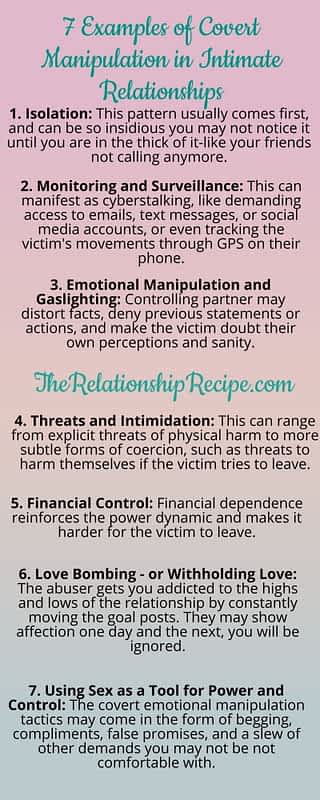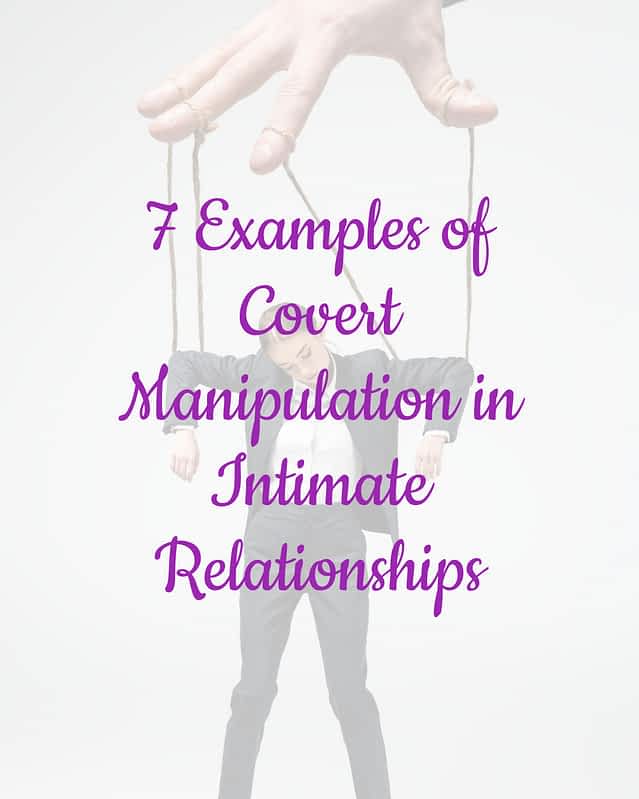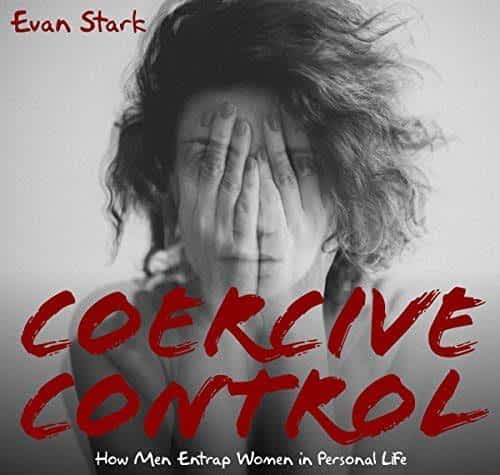7 Examples of Covert Manipulation in Intimate Relationships
It rarely starts with a slap. Abuse usually tiptoes in wearing a smile, wrapped in guilt trips, gaslighting, and “jokes” that don’t feel funny. Covert manipulation is often the opening act: the subtle, sneaky way control worms its way into your relationship before you even realize what’s happening.
At first, it might feel like love. Like passion. Like “he just cares a lot.” But over time, those little comments, the emotional pullbacks, the guilt games start to add up. Covert manipulation techniques don’t always scream abuse. They whisper it, hiding behind concern, affection, or even silence.
The truth is, covert emotional manipulation tactics are at the root of so many toxic relationship patterns. Whether it turns physical, financial, or stays strictly emotional, it all stems from these hidden manipulation tactics that make you question your worth, your memory, and eventually yourself.
💡Key Highlights
- Why covert manipulation feels like love—until it doesn’t
- The sneaky ways control shows up in day-to-day life
- How your own behavior might quietly shift without you realizing it
- The unsettling reason you crave their affection even when they’re cruel
- What to do when your instincts whisper: something isn’t right

Recognizing Patterns of Covert Emotional Manipulation Tactics
🚩Isolation: The Silent Setup
Isolation is one of the sneakiest forms of covert manipulation, and it often flies under the radar until it’s already done the damage. Sometimes, it starts with subtle comments: “She’s not really a good influence,” or “Your mom just stresses you out too much.” Other times, it’s just a slow fade; friends stop calling, texts go unanswered, and before you know it, your world has shrunk down to just him.
You might not even realize it’s happening. You’re just spending more time with your partner because that’s what love is, right? Until you notice you haven’t talked to your best friend in weeks. Or you feel like you need to ask permission to go out. That’s no accident.
If you’re feeling more and more cut off from the people who used to ground you, pause and ask yourself why. This isn’t being dramatic. It’s spotting a tactic designed to make you feel small, alone, and easier to control.
💡Covert manipulation techniques thrive in isolation. The more alone you feel, the more dependent you become. On him for approval. For comfort. For connection. And that makes it so much easier for control to tighten its grip.
🚩Monitoring & Surveillance: When Love Turns Into Policing
This one’s tricky, because it can look like love at first. “I just worry about you.” “I need to know where you are so I can feel safe.” Constant monitoring is not care – it’s control.
One of the more disturbing covert manipulation tactics is when your partner needs to know everything. Who you’re texting. What you’re doing. Where you are. Maybe they’ve asked for your passwords, or they scroll through your phone when you’re in the shower. Or maybe you’ve noticed that “Find My iPhone” is always on, and not because you asked.
This kind of behavior chips away at your privacy, your autonomy, your sense of self. And if you push back? They might accuse you of hiding something or say you’re being “ridiculous.”
💡Hidden manipulation tactics like cyberstalking or GPS tracking aren’t just creepy; they’re about power. Everyone needs space and privacy at some point. And you don’t need to explain or apologize for wanting those things in a healthy relationship.

🚩Emotional Manipulation & Gaslighting: When You Start to Doubt Your Own Mind
This one cuts deep because it messes with your reality. Covert emotional manipulation tactics like gaslighting don’t usually start with full-blown denial. They sneak in through little lies, twisted truths, or moments where you’re made to feel “too sensitive” or “crazy” for reacting the way you do.
Maybe he flat-out denies saying something you know he said. Or he spins situations so well, you start wondering if you imagined the whole thing. Maybe every time you try to talk about how you feel, the conversation somehow flips and suddenly, you’re the one apologizing.
That’s not a communication issue. That’s emotional manipulation, and it’s strategic. It’s meant to make you doubt your instincts, your memory, your truth. And the longer it goes on, the more you question yourself, and the harder it gets to stand up for your needs.
💡These covert manipulation techniques are designed to wear down your confidence piece by piece. You’re not overreacting. Your feelings are valid. And someone who loves you won’t need to distort your reality to stay in control.
🚩Threats & Intimidation: When Fear Becomes a Weapon
Covert manipulation can turn downright scary. And sometimes, it doesn’t come in the form of yelling or slamming doors. It shows up as threats, subtle or direct, that keep you walking on eggshells.
Maybe they say things like, “You’ll regret it if you leave,” or worse, “If you go, I don’t know what I’ll do to myself.” These aren’t just dramatic statements; they’re hidden manipulation tactics meant to make you feel guilty or scared.
If it’s a threat of physical harm, emotional blackmail, or making you responsible for their well-being, the goal is the same: to keep control by keeping you afraid. And that fear is a tool they’re using to dominate the relationship without ever having to raise a hand.
💡Intimidation has no place in real love. Ever.
🚩Financial Control: When Money Becomes a Leash
Money should be a shared resource in a relationship, not a weapon. But in covert manipulation, it often becomes exactly that.
Maybe you’re given an “allowance” like a child. Maybe every purchase needs to be approved, or your paycheck gets funneled into an account you can’t touch. Or maybe it’s more subtle, like discouraging you from working, hinting that you should just “focus on the home” while they handle the bills. And that’s exactly the point. If you have no money, you have no freedom.
💡Financial control isn’t about budgeting—it’s about power. These are classic covert manipulation techniques that keep you stuck, dependent, and afraid to leave because you don’t know how you’d make it on your own.

🚩Love Bombing… or Withholding Love: The Emotional Roller Coaster
Ever feel like you’re in a relationship with two completely different people? One minute you’re the center of their world: flooded with affection, sweet words, surprise gifts. The next thing you know is you’re invisible. Cold shoulder. Silent treatment. Or worse: blame and criticism for something you didn’t even know you did.
This is not passion. It’s covert manipulation, and it’s brutal. They pull you in with intense love bombing, then suddenly yank it away. This is intermittent reinforcement over and over and it’s designed to keep you addicted to that dopamine hit of emotional highs and lows. You never know which version of them you’re going to get, so you stay on high alert, constantly trying to keep the peace… and keep their affection.
Here’s where it really messes with you: when they do finally show you love again, it feels euphoric. Like maybe things are finally “back to normal.” But it’s not love, it’s a cycle. One designed to create a trauma bond that keeps you emotionally hooked.
It’s not your fault for craving the good parts. You’re human. But real love doesn’t come with emotional whiplash. You shouldn’t have to earn affection just to avoid being discarded.
🚩When Intimacy Becomes Control, Not Connection
Let’s talk about something that doesn’t get talked about enough: how covert manipulation can show up in the bedroom.
At first, it might seem like they’re just “adventurous” or trying to spice things up. They might say, “Just try it for me,” or, “This will bring us closer.” But then it keeps happening, even when you say no, or freeze, or clearly don’t feel safe. They’ll push with compliments, guilt, even promises they never plan to keep. It might not look like outright force, but it’s still pressure. It’s still manipulation.
This is one of the most hidden covert emotional manipulation tactics, because it hides under the excuse of “love” or “intimacy.” But intimacy should feel safe, not like a performance or a test you have to pass to keep their approval.
Here’s the hard truth: if they do it once and you let it slide, it usually doesn’t stop there. It escalates. Slowly. Quietly. Until your own boundaries feel blurry, or even nonexistent.

How to Spot Covert Manipulation (Even When It’s Subtle)
If you’re feeling unsettled in your relationship but can’t quite put your finger on why, listen to that voice inside you. Covert manipulation hides in plain sight, which makes trusting yourself all the more important. Here’s how to start recognizing it:
🧭 Trust Your Gut
If something feels off, it probably is. Pay close attention to how you feel around your partner: do you feel anxious, unsure, or like you’re constantly walking on eggshells? Those feelings are clues and they matter.
👀 Watch for Shifts in Behavior
Are you more quiet now? Avoiding friends? Second-guessing yourself all the time? If your behavior has changed, or theirs has become more controlling or demanding, it could be a sign of something deeper going on.
🗣️ Check In With Someone Safe
Talk to someone you trust. When you’re close to the situation, it’s easy to miss red flags. A friend or family member might notice patterns you’ve been conditioned to overlook especially if isolation has crept in without you realizing it.
📚 Get Informed, Stay Empowered
Learning about how these covert emotional manipulation tactics work gives you language for what you’re experiencing. You don’t need to have all the answers right now, just starting to understand what’s happening is a powerful first step.

What to Do After Realizing You’re Being Covertly Manipulated
🌱 Reach Out for Support
You don’t have to go through this alone. Whether it’s a friend, a sibling, a domestic violence hotline, or a support group – reach out. These people can help you feel seen, heard, and less isolated.
🛡️ Create a Safety Plan
If you’re thinking about leaving, planning ahead is essential. Start gathering important documents (IDs, birth certificates, bank info). Have a packed bag ready and keep it somewhere safe. Create a code word with someone you trust: a simple phrase that means “I need help” without raising suspicion.
🧠 Consider Therapy or Counseling
Covert manipulation can do serious damage to your self-esteem and sense of reality. A trained therapist, especially one who understands abuse dynamics, can help you process what’s happened and start rebuilding the version of you that’s been buried under control and fear.
📜 Know Your Rights
You might be surprised how much legal protection is out there for you. Research local laws related to emotional abuse, financial control, and domestic coercion. Many family law attorneys offer free consultations. Even just gathering information can be a big step forward.
💪 Start Taking Back Your Independence
Bit by bit, begin reconnecting with the parts of your life that were stripped away. Rebuild your support system. Look into jobs, hobbies, or classes that give you purpose outside the relationship.

Final Thoughts
Covert emotional manipulation isn’t just toxic; it’s a slow erosion of your reality, and independence. And because it hides behind fake kindness, concern, or charm, it can be especially hard to spot until you’re already deep in it.
But once you do start to recognize the patterns, like control disguised as care, guilt instead of love, that’s when change becomes possible.
If this all feels uncomfortably familiar, trust that instinct. Reach out. Educate yourself. Take the first small step. No one else gets to rewrite your worth or your truth, and it’s never too late to choose you.
💡Before You Go:
This is one of my favorite books on emotional manipulation through coercive control. I have read it myself and recommended it to several friends who benefitted from it.
Coercive Control: How Men Entrap Women in Personal Life
Evan Stark, who helped start one of the first shelters for abused women in the US, brings a powerful new way of looking at domestic violence. He says abuse isn’t just about physical harm—it’s about control, too. In fact, the tactics abusers use are sometimes just like those seen in terrorism or hostage situations.
Drawing on legal cases, interviews, and FBI data, Stark shows how abusers exert control by spying on communication, controlling everyday activities, and stripping away freedom. He pushes us to stop thinking of domestic abuse as only physical violence and start recognizing it as a violation of a person’s autonomy and human rights.
By calling abuse a crime against liberty, Stark reminds us that fighting domestic violence means fighting for women’s freedom and safety—and addressing the bigger, systemic inequalities that let this happen..

This post may contain affiliate links. I earn from qualifying Amazon purchases at no extra cost to you. This content is for informational purposes only and is not a substitute for professional advice. Read full disclaimer.
Thank you for reading this post, don't forget to subscribe!








